Budapest : Public transport system
Description of the network
Public transport appeared in the Hungarian capital city, Budapest, in the early 19th century in the form of the omnibus and later the horse tramway. These were followed by means of transport that were revolutionary in those times: Europe’s second funicular connected the Castle Hill with the Danube riverbank while the Continent’s third cogwheel railway was built in the Buda hills.
The first tramway was inaugurated in 1887, and by the end of the century, electric vehicles replaced their horse-drawn predecessors. Suburban railways were also built during this period. The Continent’s first underground was built in 1896 and is now part of World Heritage. The 3.7-km-long line is still in operation today. Buses and trolleybuses appeared on the streets of Budapest in the first decades of the 20th century. The development of the public transport network continued soon after World War II: the trolley network developed extensively and the chairlift was opened, which mostly serves tourists visiting the Buda hills. Preceded by long planning and implementing, the second metro line was opened in the 1970s. The third, North-South line was built between 1976 and 1990. The construction of the fourth line, connecting South Buda with the city centre was started in 2004 and was completed in 2014.
Budapest has a broad public transport system of more than 1400 km that covers the whole city and most of the suburban areas as well and carries 1.54 billion passengers a year. The core of the system is composed of the four metro lines and the sixteen railway lines, five of which are part of the city’s suburban railway system (HÉV) and 11 are state-owned. This core is complemented by 30 tramway lines, 15 trolleybus lines, and the very dense bus system. BKK introduced its public boat service on the river Danube in July 2012.
Data on PT service in Budapest and its agglomeration ordered by BKK:
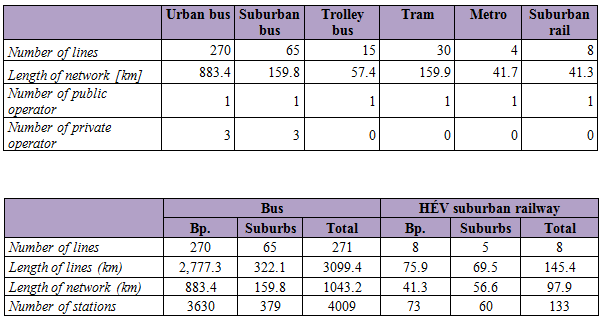
Please find all transport network maps on BKK website.
Presentation of operating companies :
BKV is the in-house operator of BKK, operating all means of local public transportation and in case of certain localities regional services as well in the Budapest metropolitan region. BKV is exclusively owned by the Municipality of Budapest, but BKK exercises asset management rights over BKV. The company has around 11,000 employees and is in charge of about 2,500 vehicles. By autumn 2012 BKV was re-organised into two divisions, bus/trolleybus and fixed-rail operations, to improve transparency and comparability with private operators. Currently, private operators offer public bus service only, while all the track-bound transport services are primarily provided by BKV.
Supply/demand data :
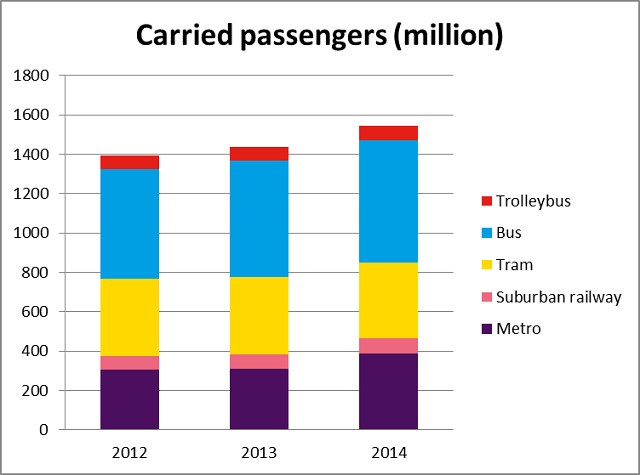
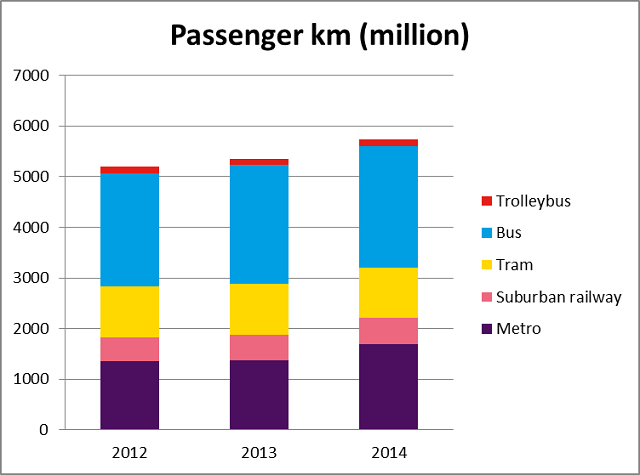
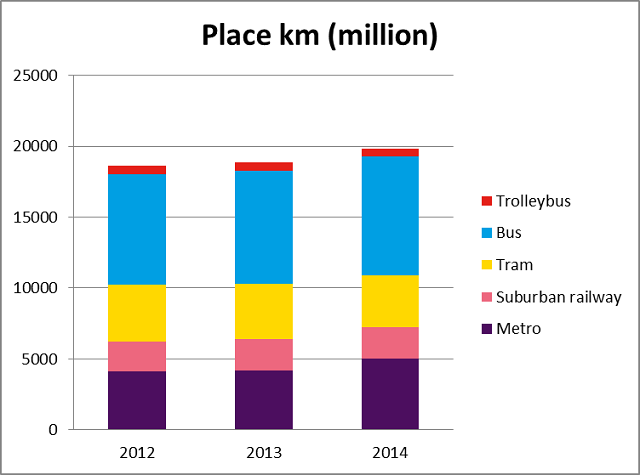
Current developments and projects
Keeping continues improvement in mind, BKK makes great effort on reaching and maintaining high quality in terms of transport infrastructure, public transport vehicles and transport related services. The ambitions of BKK are often supported by EU funding for which BKK applies successfully on a regular basis. Current developments and projects include the followings:
- New bus service framework
The new bus service framework introduced by BKK in Budapest entails a competitive tendering process which is fully compliant with EU public procurement rules and Hungarian public procurement law at the same time being completely transparent. The procedure is divided into two phases, the first being the pre-qualification phase open for application since September 2012 on an on-going basis and the second being the actual call for tender for those operators who have successfully passed the pre-qualification phase. The first two contracts resulting from the BKK tender were concluded in October 2012 with VT Transman Kft. (49.9% owned by Arriva/Deutsche Bahn,50.1% by Videoton Holding) for a total of 150 new 100% low-floor, fully air-conditioned buses; 75 single and 75 articulated ones. All vehicles are equipped with EEV-engines, CCTV security and passenger counter systems. The contract term is for eight years, which started in spring of 2013 with BKK having the option to extend the contract for another two years.
On 26 April 2014, Volánbusz Zrt. has started its public bus service on the agglomeration lines of Budapest as a new service provider of BKK. The company is 100% government owned and possesses 167 low-floor, air-conditioned buses equipped with modern passenger information system. The service of Volánbusz Zrt. was contracted for 8 years which can be extended for 2 more years.
T&J Busz Projekt Ltd. is a private operator that started its public bus service as a service provider of BKK on 17 January 2015 with gradually implemented services. By 1 March 2015, its whole fleet consisting of 25 articulated hybrid buses were in operation. The operation of 25 hybrid buses is supported by additional 3 stock vehicles. Like all buses procured after 2010, these are also low-floor buses and are equipped with air-conditioning and modern passenger information system. The service of the company was contracted for 8 years which can be extended for 2 more years.
After another successful tender, on 1 May 2015 VT-Arriva (the successor of VT Transman Ltd.) put new solo buses into operation which were followed by new articulated buses from 1 June 2015. Until the end of 2015 a total amount of 150 new buses (75 solo, 75 articulated) will have entered service. Furthermore, in 2016, additional 45 articulated buses will start service in Budapest. The service provider guarantees the contracted service with the overall of 82 solo and 132 articulated buses in stock. VT-Arriva is currently the leading private bus operator in Hungary. It is owned by a Hungarian industrial group and a subsidiary of the Arriva Group. The company currently has more than 900 employees and 466 buses throughout Hungary, 270 of which operate in Budapest.
In the development of the vehicle fleet, BKK renews the trolleybus fleet gradually until the end of 2015, as altogether 36 modern new low-floor vehicles are going to start the operation in Budapest. The tender also includes the option to procure 72 additional vehicles in the following years. BKK had a successful procurement for 16 diesel midibuses with BKK having the option for procuring 24 more. The midibus fleet is going to be strengthened in the following years, as BKK had a successful tender for 7 new electric midibuses with the option of 14 more to be procured.
BKK carries out continuous quality control to ensure passenger satisfaction by meeting high expectations for punctuality and cleanness while at the same time making public transport more and more attractive. Since 2011, more than 200 used but well-maintained vehicles and more than 450 modern, brand new vehicles were obtained for the public transport fleet of Budapest.
- Rolling stock development
The metro vehicle fleet of Budapest is being gradually renewed. In the autumn of 2012, the first trains of the 22 five-car train sets type Metropolis by Alstom for metro line M2 entered service. In May 2014, additional 15 four-car train sets have started operation in the new metro line M4. With the reconstruction of the metro line M3, the old trains are going to be renovated and the first refurbished trains are expected to enter service in 2017. Metro line M1, the first metro line of the continent is also going to receive new vehicles during the current EU financing period. In addition to metro vehicles, in the autumn of 2015, the first new trams provided by CAF enter operation. A total of 47 modern low-floor CAF trams are going to start service in line 1, 3, 19 and 61.
- Introduction of the Automated Fare Collection (AFC) system
Without question, one of the most challenging projects of BKK is the introduction of the new AFC system. The new system will bring numerous tangible changes for passengers: paper-based tickets and passes are expected to be replaced by electronic fare payments from 2016 onwards, and new elements are planned for the ticketing system: most notably time-based tickets, daily capping and pay-as-you-go payments using contactless bank cards. Another significant change will be that after the introduction of the National Integrated Card System, which is being implemented by the Government, students, pensioners and all concerned will be able to use public transport availing of the concessions to which they are entitled. In addition to the reform of the fare scheme, BKK will introduce modern sales channels (internet, mobile phone) while the renewal of the ticket vending machine network with the installation of 300 new machines has already started. Owing to the technological solution to be introduced, counterfeiting of tickets and passes can be eliminated. By installing automatic access gates on the metro and some suburban railway stations instead of relying on human ticket inspectors, the revenue protection system will be more efficient by reducing fare evasion as well. The new system will be server-centric and will be one of the most complex payment processing and IT development projects in Hungary.
- The FUTÁR System
The FUTÁR (Traffic Management and Passenger Information) system is based on the implementation of the new GPS-based automated vehicle location (AVL) and passenger information system for surface transport in Budapest from 2013. All trams, buses and trolleybuses are equipped with a satellite geographical positioning system providing real-time information for traffic control and passenger information as well as for service and performance management purposes. The system also provides input data for better service planning resulting in better efficiency thereby achieving cost-saving. At the same time, the transparency and accountability of individual operators, both BKV and private, is ensured, thus improving service quality.
The system does not only provide substantial support for traffic controllers in their work, but also delivers real time information to our customers, the passengers. The project contains homogeneous vehicle monitoring and positioning, traffic control and failure management, real time passenger information on all trams, buses, trolleybuses and boats, at 286 junctions and stops, on mobile phones and on the internet. Public transport prioritisation at 30 traffic lights is also part of the system as well as a new audio-communication system. In addition, BKK has implemented a central transport information system as well as developed and operates a single mobility website for real-time journey planning which is also available through a smart phone application. By joining the Transmodel community, real time information about the public transport system of Budapest is now available for regional operators as well which means another step towards integrated passenger information, traffic control and service management. A wide range of further qualitative FUTÁR developments are technically practicable including integration of suburban railways into current traffic management and passenger information system, integration of FUTÁR and a yet-to-be-implemented AFC system as well as collection of vehicle diagnostic data through FUTÁR.
- BMT Balázs Mór Plan and Sustainable Urban Mobility Planning
In 2015, BKK has issued BMT Balázs Mór Plan, the first transport development plan of Budapest based on SUMP principles, which document defines the main directions of development and strategic goals until 2030. BMT builds on the future vision of the urban development plan of Budapest and is in line with other local, regional and national level strategic documents. The elaboration of the plan took place in partnership with several stakeholders and was based on an analysis of current situation in Budapest and its region. The general and the three strategic objectives of the plan were formulated based on a thorough analysis of the current situation and on the subsequently drawn problem tree. The objectives of the plan are aimed to be reached through intervention in the fields of infrastructure, vehicles, services and governance. 9 operative objectives are defined in the matrix of strategic objectives and intervention areas and consist of 59 different measures which are to be pursued in the upcoming 15 years.
Having the strategy ready, BKK is also working on the next steps of the SUMP cycle. For the realisation of the strategy, a 4 year-long program is being prepared, while in parallel to that, a monitoring and evaluation system is also being elaborated. The latter one aims to keep track not only on project implementation but on the implementation of the program and the strategy as well. Close to the end of the 4-year-long program in 2019, BMT is going to be revised to adapt any necessary adjustments based on experiences and trends.
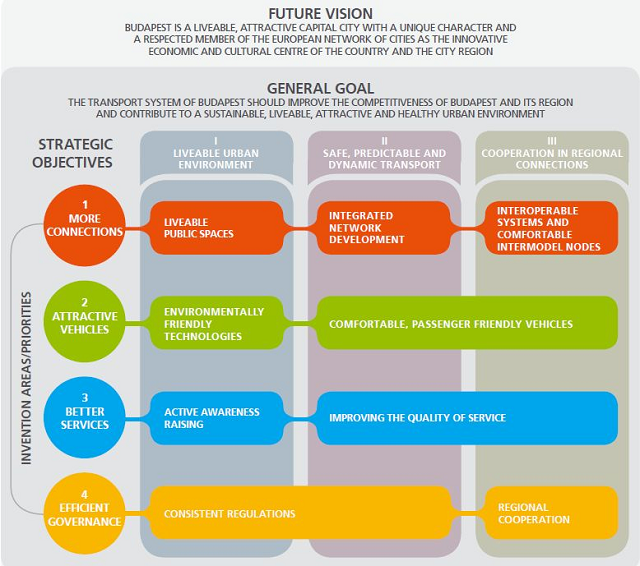
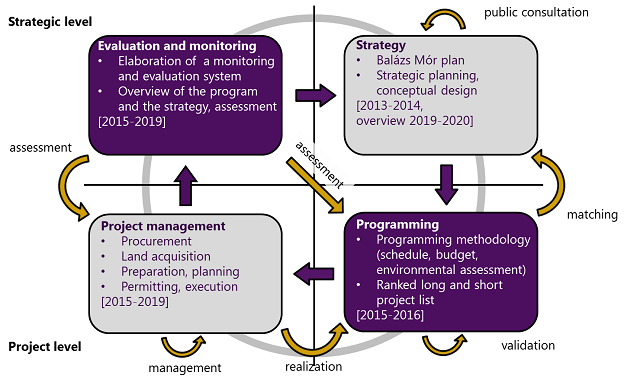
- MOL Bubi public bike sharing scheme
By launching the MOL Bubi public bike sharing scheme, BKK opened a new chapter in Budapest’s public transport. By improving the conditions of cycling, BKK’s objective is to achieve that more and more passengers would opt for cycling as their travel alternative (and often as a part of a multimodal transport chains) to reach their destinations within a short distance in Budapest, and to increase the currently 2% modal share of cycling up to 10% until 2020. Public tenders for implementation and operation of the system and a side project for the cycling-friendly development of the existing road network in the service area were carried out in 2013. System deployment was done by the spring of 2014. Finally, after 2,000 recruited heavy users participated in the public test phase of MOL Bubi, BKK started public operation with 76 docking stations and 1100 bicycles in the downtown area of Budapest in September 2014. The penalties imposed by BKK on the supplier due to the delayed fulfillments are invested into the development of the bike-sharing system, therefore additional 5 km2 of service area with 22 new docking stations containing 616 docking stands and 50 new bikes were added in 2015.
- Participation in European projects
In 2015, BKK is being involved in five Research & Development and Research & Innovation projects co-funded by the EU as a full consortium member: TIDE (Transport Innovation Deployment for Europe) and NODES (New tOols for Design and OpEration of Urban Transport InterchangeS) are running until September 2015 ; CH4LLENGE (Addressing the four key challenges of sustainable urban mobility planning) and STARS (Sustainable Travel Accreditation and Recognition for Schools) are running until March 2016, while FLOW (Furthering Less congestion by creating Opportunities for more Walking and cycling), the first project of BKK under the program Horizon 2020 is running until May 2018. These projects aim to tackle various urban mobility challenges from regional integration through youth education to transport modelling. BKK is also being involved in the project SOLUTION (Sharing Opportunities for Low carbon Urban transporTatION) as leading city to share knowledge and experience about urban mobility with committed take-up cities from Asia and South America.
As BKK is committed to innovation and development, it applies regularly for further research and development and innovation projects. Currently, proposals for the projects SMART-MR and CRITERIA under the Interreg-Europe 2014-2020 and Horizon 2020 programs of the European Union are under evaluation.
- Further ongoing and projects that start in the period 2014-2020
![]() Integrated development of Budapest’s tram and trolleybus network
Integrated development of Budapest’s tram and trolleybus network ![]() Implementation of interoperable service of metro line M2 and suburban railway lines H8 and H9
Implementation of interoperable service of metro line M2 and suburban railway lines H8 and H9 ![]() Extension of metro line M1 and implementation of barrier-free metro stations
Extension of metro line M1 and implementation of barrier-free metro stations ![]() Extension and reconstruction of metro line M3
Extension and reconstruction of metro line M3 ![]() Southern extension of tram line 1
Southern extension of tram line 1 ![]() Implementation of tram line between Budapest downtown and Újpalota in District XV
Implementation of tram line between Budapest downtown and Újpalota in District XV ![]() Development of an intermodal node at the Őrmező with the integration of local and national transport
Development of an intermodal node at the Őrmező with the integration of local and national transport